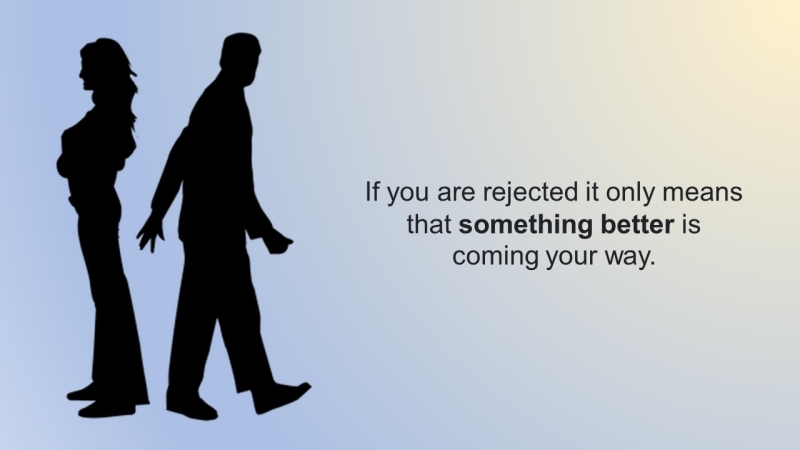REJECTION IS A DIFFICULT PILL TO SWALLOW. Whether it’s a job application, a romantic interest, or a creative pursuit, being told “no” can feel like a personal attack. It’s natural to feel disappointment, frustration, and self-doubt when faced with rejection. But what if we told you that rejection could be a blessing in disguise?
In this article, we’ll explore why rejection can be a good thing and how to embrace it as an opportunity for growth and self-discovery. We’ll challenge the notion that rejection is always a negative experience and show you how to turn it positive. So, if you’ve recently experienced rejection or fear it in the future, keep reading to discover how to transform it from a setback into a stepping stone towards a better life.
The Benefits of Rejection
Rejection is frequently thought of as a bad event that can cause disappointment, sadness, and self-doubt. However, it’s essential to recognize that rejection can have some benefits that can help us grow and learn in ways we never thought possible. Here are some of the benefits of rejection:
Rejection can help us grow and learn.
Rejection can serve as a wake-up call that something isn’t working in our lives and that we need to make changes.
We can learn from rejection by reflecting on what went wrong, what we could have done differently, and what we can improve upon for the future.
By learning from rejection, we can become better versions of ourselves and grow in ways we might not have otherwise.
Rejection can lead to better opportunities.
Sometimes rejection is simply a sign that we’re not meant to be where we thought we wanted to be and that something better awaits us.
By embracing rejection and seeing it as an opportunity to grow, we can open ourselves up to new and exciting possibilities that we might not have considered before.
Some of the greatest success stories have started with rejection, such as J.K. Rowling, who numerous publishers rejected before finally finding success with Harry Potter.
So the next time you experience rejection, don’t despair. Instead, try to view it as a chance for development and learning and a sign that something better is just around the corner.
Changing Our Mindset
Rejection is frequently viewed as a bad experience that we try to stay as far away from as possible. However, by altering our perspective, we can discover how to see rejection as a chance for personal growth. Here are some pointers for changing your viewpoint:
- Acknowledge your emotions: Rejection can be painful, and allowing yourself to feel your emotions is crucial. Permit yourself to feel sad, angry, or disappointed but don’t let those emotions consume you.
- Recognize the growth potential: Instead of seeing rejection as a failure, try to view it as a learning opportunity. What can I learn from this experience, you might ask yourself? How can I use this feedback to improve myself or my skills?
- Reframe negative thoughts: It’s easy to fall into a negative spiral after experiencing rejection. However, reframing your negative thoughts can create a more positive outlook. Consider the following example: Instead of thinking, “I’m not good enough,” try thinking, “I have room for improvement, and I am committed to improving.”
- Practice self-compassion: Be kind to yourself during the process of rejection. Give yourself the same kindness and empathy you would give a friend going through a difficult time. Remember that rejection does not indicate your value or worth as a person.
We can see it as a blessing in disguise by changing our mindset and embracing rejection as a learning opportunity.
How to Handle Rejection Gracefully
Rejection can be painful, but it doesn’t have to be debilitating. Here are some pointers for accepting rejection politely:
Acknowledge and Process Your Emotions
- Allow yourself to feel your emotions. It’s natural to feel sad, disappointed, angry, or frustrated when facing rejection. Recognize your emotions and permit yourself to experience them without passing judgment.
- Write down your thoughts and feelings. Writing in a journal can be a useful tool for processing your feelings and gaining perspective.
- Seek support from loved ones. Talk to friends or family members who can offer comfort and encouragement.
Practical Strategies for Bouncing Back
- Focus on what you can control. While you can’t control the outcome of a situation, you can manage your response to it. Focus on what you can do next to move forward.
- Reframe the situation. Instead of viewing rejection as a personal failure, consider it an opportunity to grow. Ask yourself what you can learn from the experience.
- Stay positive. Be grateful and keep your attention on the positive aspects of your life. Remember that rejection does not indicate how valuable you are as a person.
- Take action. Instead of dwelling on the rejection, take action toward your goals. Keep moving forward and stay motivated.
By handling rejection gracefully, we can learn to embrace it as a blessing in disguise. It may not always be easy, but by changing our mindset and using practical strategies, we can grow and thrive even in the face of rejection.
How to Handle Rejection with Resilience
Rejection can be brutal, but we can bounce back more vital than ever with the right mindset and strategies. Here are some tips for handling rejection with resilience:
Acknowledge and process your emotions.
Allowing yourself to feel rejection, disappointment, and sadness is essential. Don’t try to push these feelings away or suppress them. Acknowledge them and allow yourself to process them.
Practice self-compassion
Treat yourself with kindness and compassion during this time. Don’t beat yourself up or dwell on negative thoughts. Remind yourself that rejection is a natural part of life and doesn’t define your worth or value.
Focus on the positives.
Instead of dwelling on the rejection, shift your focus to the positives. What did you learn from the experience? What skills did you gain? What other opportunities might this rejection lead to?
Stay motivated
It can be easy to lose motivation after experiencing rejection, but it’s essential to keep pushing forward. Set new goals for yourself and stay focused on your passions and interests. Make sure you have a strong network of family and friends by your side who can inspire and motivate you.
Remember that rejection is not the end.
One rejection does not define your entire life or career. Keep in mind that rejection is often a necessary step toward success. Embrace rejection as a learning experience and keep pushing forward towards your goals.
Embracing Rejection in Everyday Life
Rejection is a part of life, and learning to embrace it can lead to personal and professional growth. Here are some examples of how embracing rejection can be beneficial:
Opportunity for Growth
- Rejection can help us identify areas where we need to improve and grow.
- It can inspire us to put in more effort, be more creative, and learn new techniques and skills.
By facing rejection head-on and learning from it, we become more resilient and adaptable, which can help us succeed in the long run.
New Opportunities
- Rejection can lead to new opportunities that we may not have considered before.
- Opening ourselves up to different possibilities, we may discover paths we would never have explored otherwise.
- Rejection can also help us refine our goals and aspirations, leading us to new and more fulfilling experiences.
A Positive Mindset
- Seeing rejection as an opportunity rather than a failure can profoundly impact our mindset and overall well-being.
- By focusing on the positive aspects of rejection, we can cultivate a growth mindset that allows us to view challenges as opportunities for growth and development.
- This mindset can help us navigate life’s ups and downs with greater resilience and optimism.
Embracing rejection can be a powerful personal and professional growth tool. By changing our mindset and seeing rejection as an opportunity rather than a failure, we can learn from our experiences, develop new skills, and open ourselves up to new possibilities. So, the next time you face rejection, remember that it’s not the end of the road but rather a chance to grow and thrive.
Conclusion
As we’ve seen, rejection is not the end of the road. It may offer a significant chance for development, education, and transformation. By developing the ability to accept failure, we can reach our full potential and achieve great success in our personal and professional lives.
Remember, rejection is not a reflection of our worth as individuals. It’s simply a part of the journey to success. We can approach it with resilience and grace by changing our mindset and reframing negative thoughts about rejection.
So the next time you face rejection, don’t be discouraged. Instead, consider it a chance to improve yourself and learn new things. Embrace rejection as a blessing in disguise, and you’ll be amazed at the new opportunities that come your way.
CLICK THE IMAGE TO LEARN MORE


